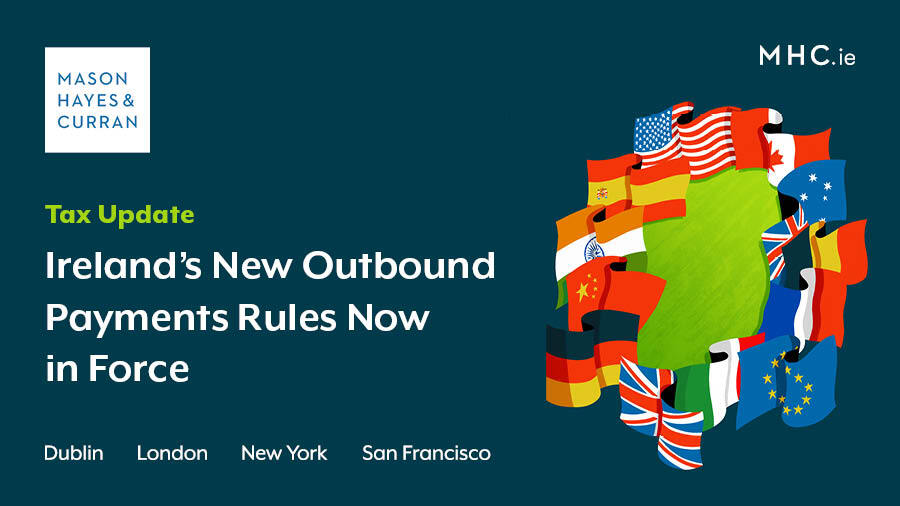Ireland’s New Outbound Payments Rules Now in Force

New tax rules are now in effect which could have an impact on payments of interest, royalties and distributions from Irish companies to entities in certain zero tax and specified territories. Our Tax team considers the rules and key takeaways from Revenue’s recently published guidance.
Ireland’s new outbound payments rules took effect from 1 April 2024. The measures are aimed at certain payments made by Irish resident companies to associated entities located in zero-tax / no-tax jurisdictions or jurisdictions on the EU’s list of non-cooperative jurisdictions (a Specified Territory). Where the new rules apply, domestic exemptions from Irish withholding tax on these payments are disapplied. Also, in a novel step, the long-standing withholding tax regime for non-yearly interest and royalties has been amended by these rules.
Revenue recently published guidance to assist taxpayers and practitioners in interpreting and applying the new rules. The guidance includes a range of helpful examples to illustrate their application.
We have considered the general application of the rules and set out some key takeaways from the guidance.
What types of payment are covered?
The outbound payments rules can apply to payments of interest, royalties or distributions by an Irish resident company. Specifically, the rules apply to:
- Interest payments which are tax deductible for the Irish paying company. Interestingly, this means that the new rules can apply to payments of “short” interest, ie interest that is not capable of arising for a period of at least one year, even though interest withholding tax does not normally apply to payments of short interest.
- Royalty payments which are tax deductible for the Irish paying company. Generally, Irish withholding tax on royalties currently applies only for patent royalties, with exemptions available depending on the circumstances. However, under the new rules, the withholding tax charge has been extended to apply to royalty payments to associated entities in Specified Territories for copyrights, trademarks, designs or models, plans, secret formulae or processes. Clients should review all IP licence arrangements which may be connected with Specified Territories on foot of this change of law.
- Dividends or other distributions made out of income, profits or gains which, broadly speaking, have not been chargeable, directly or indirectly to tax. This includes deemed distributions, eg an interest payment which has been re-characterised as a distribution for Irish tax purposes.
Is the payment being made to an “associated entity”?
The new rules only apply where the payment in question is made to an “associated entity”, which has “definite influence” in the management of the other entity. Broadly speaking, this means an entity in a relationship of 50%+ control with the Irish paying company.
An entity will be considered to have definite influence in another entity where that entity:
- Has the ability to participate on the board of directors or equivalent governing body of the other entity, and
- That ability causes or may cause the affairs of the other entity to be conducted in accordance with the wishes of the first entity.
This is a new concept of control in Irish tax law. Revenue’s guidance sets out one example of a “definite influence” scenario but stops short of considering the myriad examples practitioners will encounter. Therefore, we anticipate this will be a point of debate absent further, more detailed guidance.
In a welcome clarification for securitisations, Revenue have confirmed that two entities will not be considered as associated for the purposes of the rules solely by the fact that their shares are held on trust by the same nominee or trustee where there is no other association between those entities.
Is the associated entity in a Specified Territory?
As highlighted, zero-tax / no-tax jurisdictions or jurisdictions on the EU’s list of non-cooperative jurisdictions are considered Specified Territories for the purposes of the new rules. In addition, the Revenue guidance confirms that territories that do not have tax law with regard to the income, profits and gains of entities in that territory will be considered a Specified Territory.
Revenue’s guidance also provides helpful confirmations that:
- A territory will not be considered a Specified Territory solely on the grounds that it has a territorial or a remittance-based tax regime, or on the basis that a participation exemption for dividends applies in that territory.
- Territories which generally apply tax but which have free-trade zones and special economic zones as a feature of their tax regimes will not be considered Specified Territories.
- A territory will not be a Specified Territory merely because it treats certain entities as tax transparent.
These clarifications are welcome and could be relevant to payments made to jurisdictions such as Hong Kong, Singapore and the UAE, for example.
Applicable time period
The new outbound payments rules apply to arrangements entered into post-19 October 2023 for payments of interest, royalties and distributions, on or after 1 April 2024.
To the extent that arrangements were in existence on or before 19 October 2023, the application of the new rules is deferred until 1 January 2025 to facilitate a transition to the new rules. Revenue’s guidance provides examples of these arrangements, including those related to the issuance of an interest-bearing loan note, or the declaration of a dividend / distribution on or before 19 October 2023.
Exclusions
Even where a payment is in scope of the new rules, there are several exclusions. It is important to emphasise that this is an anti-avoidance measure so, where the payment is subject to a foreign tax, including non-refundable withholding tax, the rules should not apply.
The Revenue guidance provides confirmation of Revenue’s interpretation of these exclusions with examples, including the following:
- Under the outbound payments rules, payments made to a tax transparent or “look through” entity located in a Specified Territory are generally treated as being made directly to the owners of that entity for the purposes of the rules. The guidance confirms that this treatment applies to structures with multiple layers of tax transparent entities. It should be noted that a different and more complex analysis may be required for the purpose of Ireland’s anti-hybrid rules.
- The guidance confirms that the rules should not generally apply to payments to a transparent entity which is a fund and is held widely by non-associated investors resident in various jurisdictions.
- Certain payments and distributions are excluded from the scope of the new measures where it is “reasonable to consider” that double non-taxation does not arise. The guidance confirms that this does not mean that the taxpayer has perfect knowledge of the tax treatment of the payment. Rather, it suggests that:
- The paying company has taken action and thought carefully about the tax treatment of a payment in a manner akin to a hypothetical reasonable entity, and
- Is not using artificial structures to ensure that it is unaware of the potential tax treatment of a payment.
- The guidance confirms that it is reasonable to consider that double non-taxation does not arise for payments which are:
- Subject to foreign tax, including non-refundable withholding tax,
- Subject to a top-up tax under OECD’s Pillar Two model rules which impose a global minimum effective tax rate, or would have been but for the application of a safe harbour, or
- Subject to a controlled foreign company charge in another territory, such as the GILTI tax under US law.
- There is also an important clarification for quoted Eurobonds and wholesale debt instruments which are issued via a clearing system. In this case, the new rules will not apply where it is reasonable to consider that the payor of interest on such an instrument is not, and should not, be aware that any portion of the interest is payable to an associated entity. This is subject to specific anti-avoidance measures.
- For interest payments, Revenue have confirmed in their guidance that there is no new withholding obligation on intermediaries, such as clearing houses, as a result of the new rules, and that the rules only apply to the company paying the interest.
- The guidance includes a number of examples that will be useful in determining the practical application of the rules to dividend payments.
Conclusion
The outbound payments rules are now in effect and apply to in-scope payments of interest, royalties and distributions by Irish resident companies.
Organisations should be mindful of these rules and, where relevant, may wish to consider potential restructuring options.
For more information and expert advice on how the new rules apply to corporate, financing, or IP licensing structures, please contact a member of our Tax team.
The content of this article is provided for information purposes only and does not constitute legal or other advice.
People also ask
What is an outbound payment? |
A payment of interest or royalties or the making of a distribution by an Irish resident company to a non-Irish resident company. |
What is “definite influence”? |
Definite influence is the ability of an entity to participate on the board of directors or equivalent governing body of another entity, or in the financial and operating policy decisions of another entity, where that ability causes, or could cause, the affairs of the entity to be conducted in accordance with the wishes of the first-mentioned entity. |
Is there withholding tax on royalties in Ireland? |
Irish withholding tax on royalties was limited to payments of royalties in respect of patents, and there are certain exemptions that may be available depending on the circumstances. Since the introduction of the outbound payments rules, effective 1 April 2024, withholding tax can apply to a wider range of royalties, including those paid in respect of copyrights, trademarks, designs or models, plans, secret formulae or processes. |
Share this:



